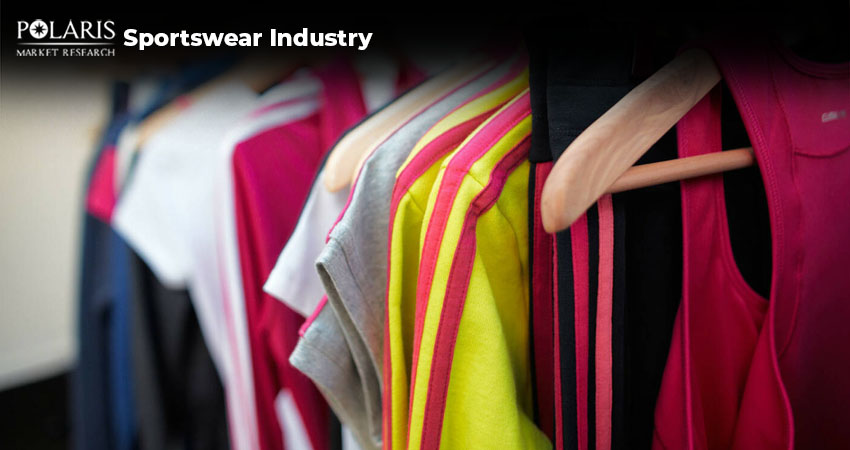Sportswear Industry Trends

Imagine stepping onto the track in a pair of cutting-edge running shoes, engineered to maximize energy return. Or slipping into a breathable, sweat-wicking shirt that keeps the wearer cool even during an intense workout. Sportswear is no longer just about looking the par; it’s about enhancing performance, improving comfort, and even making a fashion statement. In today’s world, sportswear has extended beyond the gym and playing field. It’s now a blend of technology, sustainability, and style, with leading brands competing to push boundaries.
Whether it’s high-tech smart fabrics, eco-friendly production, or athleisure trends, the sportswear industry is evolving fast. So, which companies are driving this revolution? Let’s explore the biggest names that are shaping the sportswear industry, each with its unique edge.
Rise of Sportswear
Sportswear used to be just for athletes and people who went to the gym, but now they're popular all over the world. The shift from clothes that were only for working out to stylish everyday outfits has happened because of new ways of living and more focus on being healthy. The trend of athleisure as regular clothes, which celebrities and influencers have made popular, has made it difficult to tell the difference between workout gear and casual fashion. High-performance fabrics, moisture-wicking technology, and designs that fit the body have made sports clothes comfier and more useful than before.
Additionally, sustainability has become a key focus, with brands adopting recycled materials and eco-friendly production methods. Consumers now prioritize ethical purchasing, pushing companies to innovate while reducing their environmental impact.
Emerging Trends in Sportswear
Sustainability
-
- Eco-friendly Materials: Brands are increasingly using recycled plastic, fishing nets, and other waste materials to create high-performance fabrics. Organic cotton, grown without harmful pesticides, is gaining popularity as a sustainable alternative to conventional cotton.
- Ethical Labor Practices: Consumers are demanding transparency in supply chains and manufacturing processes to ensure fair labor practices and safe working conditions. Brands are focusing on fair wages, safe working conditions, and transparency in the supply chain.
Technology Integration
- Performance-enhancing Materials: Performance-enhancing material trends in sportswear focus on moisture-wicking, breathability, stretch, durability, and sustainability, with materials like polyester, nylon, spandex, and recycled fibers gaining popularity, along with antimicrobial treatments and smart fabric.
- Smart Sportswear: These types of sportswear incorporate sensors and conductive fibers to monitor physiological parameters like heart rate, body temperature, and muscle activity. Smart sportswear can provide real-time feedback to athletes during workouts, helping them optimize their performance and technique.
- Comfort and Style: Athleisure wear continues to blend athletic and casual styles, with consumers seeking comfortable and stylish options for everyday wear. Seamless design minimizes scratching and rubbing and provides a smooth, comfortable experience, enhancing both comfort and style.
- Luxury Athleisure: Luxury athleisure in sportswear elevates comfort and versatility by blending athletic and leisurewear with premium materials, impeccable craftsmanship, and high-end design, creating a fusion of performance and luxury for everyday wear and social settings. Luxury brands are collaborating with sportswear labels to create high-end athleisure collections.
Smart Wearables
- Smart sportswear combines advanced textile technology with electronics to create garments that function as wearable devices, offering features beyond traditional sportswear. Tech-integrated apparel is redefining performance wear.
Top Companies in Sportswear Industry
- Nike
Founded: 1964
Headquarters: Beaverton, Oregon, USA
Key Innovation: Air cushioning, Dri-FIT, Flyknit, Vaporfly
Iconic Products: Air Jordan, Air Max, Nike Pro
Nike is the undisputed leader in sportswear, known for its cutting-edge technology and iconic branding. With innovations like Air cushioning, Dri-FIT fabric, and Flyknit technology, Nike has set industry standards. The company collaborates with top athletes globally, reinforcing its dominance in basketball, running, and football. Nike’s sustainability efforts, such as the Move to Zero initiative, aim for zero carbon and zero waste, appealing to eco-conscious consumers.
Founded: 1949
Headquarters: Herzogenaurach, Germany
Key Innovation: Primeknit, Parley Ocean Plastic
Iconic Products: Stan Smith, Predator football boots
Adidas is Nike’s biggest competitor, renowned for its performance-driven designs and classic styles like the Stan Smith and Superstar sneakers. The brand heavily invests in football, sponsoring major teams and events like the FIFA World Cup. Adidas also focuses on sustainability with its Primeblue and Primegreen lines, made from recycled ocean plastic. Collaborations with top athletes and celebrities have strengthened their influence in streetwear culture.
- Lululemon
Founded: 1998
Headquarters: Vancouver, Canada
Key Tech: Fresh Foam, FuelCell
Lululemon pioneered the yoga apparel movement, blending functionality with luxury. Its signature Align leggings and ABC pants for men are cult favorites, known for their buttery-soft fabric and durability. The brand has expanded into running and training gear while maintaining a strong community-focused approach through fitness events and digital workouts.
Founded: 1948
Headquarters: Herzogenaurach, Germany
Key Innovation: Nitro foam, Hybrid running tech
Iconic Products: Puma Suede, RS-X
Puma, a major rival to Adidas, has carved its niche with bold designs and high-performance footwear. Known for its partnerships with major sprinters and footballers, Puma excels in speed and agility-focused sportswear. The brand has also made strides in sustainability with its Forever Better initiative, emphasizing recycled materials and reduced water usage.
- Reebok
Founded: 1958
Headquarters: Boston, Massachusetts, USA
Key Products: CrossFit gear, classic sneakers
Reebok, now under Adidas’ umbrella, is a powerhouse in CrossFit and functional fitness. Its Nano and Legacy Lifter series are favorites among gym enthusiasts. Reebok also embraces retro trends, re-releasing classics like the Club C and Instapump Fury. The brand’s Cotton + Corn initiative focuses on plant-based, biodegradable footwear.
Final Thoughts
The sportswear industry is moving beyond performance, it’s about technology, sustainability, and culture. The field keeps growing thanks to new ideas, fashion trends, and eco-friendly practices. As tech and green methods get better, sportswear's future looks set to offer even better performance and style. Whether individuals are into sports or just want comfy everyday clothes, sportswear stays a key part of life today.

